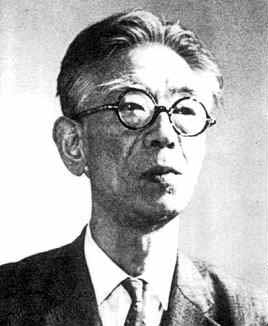
Kiyoshi Oka
 المؤلف:
R Remmert
المؤلف:
R Remmert
 المصدر:
Kiyoshi Oka : Collected papers
المصدر:
Kiyoshi Oka : Collected papers
 الجزء والصفحة:
...
الجزء والصفحة:
...
 21-9-2017
21-9-2017
 16733
16733
Born: 19 April 1901 in Osaka, Wakayama Prefecture, Japan
Died: 1 March 1978 in Nara, Japan

Kiyoshi Oka entered the Imperial University of Kyoto in 1922 to study physics. However in 1923 he changed topic to study mathematics, graduating with a degree in mathematics in 1925.
In the same year he was appointed as a lecturer in the Faculty of Science at the Imperial University of Kyoto. In 1929 he was promoted to assistant professor of mathematics. In fact 1929 was a very significant year for Oka for in that year he took sabbatical leave and went to the University of Paris. He became interested in unsolved problems in the theory of functions of several complex variables while working in Paris. The reason that his work took this direction was that in Paris he became acquainted with Julia.
Oka remained on the staff at the Imperial University of Kyoto while he was on leave in Paris but on his return to Japan in 1932 he accepted a position as assistant professor in the Faculty of Science of Hiroshima University.
In 1938 Oka went to Kimitoge in Wakayama where he studied, presented his doctoral thesis to the University of Kyoto in 1940. After obtaining his doctorate, Oka was a research assistant at Hokkaido University during 1941/41, then, with the support of the Huju-kai Foundation under the chairmanship of Takagi, he spent the next seven years again at Kimitoge in Wakayama.
Oka was appointed professor at the Nara University for Women in 1949, a post he held until 1964. From 1969 until his death in 1978, he was professor of mathematics at the Industrial University of Kyoto.
His most famous work was published in a 25 year period from 1936, when he solved a number of important problems. He worked on the theory of functions of several complex variables. Henri Cartan describes in [1] the way that Oka came into the subject:-
The publication in 1934 of a monograph by Behnke-Thullen marked a crucial stage in the development of the theory of analytic functins of several complex variables. By giving a list of the open problems in the area, this work played an important role in deciding the direction of Oka's research. He set himself the almost super-human task of solving these difficult problems. One could say that he was successful, overcoming one after the other the obstacles he encountered on the way.
However, the technical aspects of his proofs and the way he presents his results make his work difficult to read. It is only with considerable effort that one can appreciate the considerable strength of his results. This is why, even today, it is worth collecting his work as a tribute to its creator, Kiyoshi Oka.
Oka was also interested in Japanese poetry and Zen philosophy.
Oka received a number of important honours. He was awarded the Medal of the Japan Academy of Science in 1951, the Asahi-bunka-sho Prize of Culture in 1954 and the Bunka-kunsho Medal of Culture in 1960.
Books:
- R Remmert (ed.), Kiyoshi Oka : Collected papers (Berlin-Heidelberg- New York, 1984).
 الاكثر قراءة في 1900to1904
الاكثر قراءة في 1900to1904
 اخر الاخبار
اخر الاخبار
اخبار العتبة العباسية المقدسة


